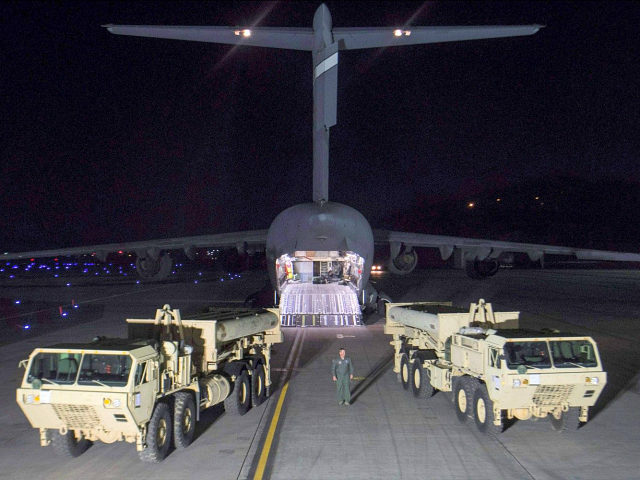South Korea’s newly-installed left-wing government has halted the installation of multiple parts of the American Terminal High Altitude Area Defense System (THAAD) due to environmental concerns, an announcement stated closely followed by a new North Korean missile launch.
An unnamed official for the government of liberal President Moon Jae-in confirmed to CNN that they would leave parts of the THAAD system already installed untouched while halting the installation of the rest of the system until “a full-blown environmental impact assessment is completed.” The outlet notes that such a delay would mean South Korea would not possess the fully-operational system until well into next year.
Seoul’s presidential palace also confirmed this change, according to the South Korean newswire service Yonhap. It remains unclear what sort of environmental concerns the government fears THAAD could exacerbate in the country.
The THAAD system is designed to shoot any incoming missiles targeting Japan and South Korea out of the sky. Both the United States and the South Korean government, under previous president Park Geun-hye, insisted the purpose of installing the system was to protect the country from a North Korean missile attack. The THAAD system is capable of reaching far past North Korea, however, deep into Chinese and Russian territory, triggering alarmed opposition from both countries. THAAD is currently “partially operational,” CNN notes.
Moon objected to the implementation of THAAD as a candidate and has protested that he has not been provided the full existing information on the system. The South Korean president is scheduled to meet U.S. President Donald Trump this June during a visit to Washington, Yonhap notes, where THAAD and any preventative measures against a potential North Korean attack will be paramount in their conversations.
American officials responded patiently to the announcement that the system would take more time to fully install. “The US trusts (South Korea’s) stance that the THAAD deployment was an alliance decision and it will not be reversed,” Pentagon spokesman Navy Cmdr. Gary Ross told reporters, adding that the United States would be present “throughout this process,” apparently referring to the planned environmental studies. Pentagon officials confirmed they believed South Korea was not planning on canceling the installation of the system.
“The United States and South Korea have worked closely together on Alliance issues and we look forward to continuing our close coordination with the Moon administration,” a State Department official told the Korea Herald.
South Korea is facing heavy diplomatic and economic pressure from China to cease the installation of the THAAD system. Foreign Policy argues that the environmental survey may be a clever way of showing goodwill towards Beijing. If so, the Chinese government appears unconvinced.
“THAAD is a strategic trap and South Korea is deeply mired in it. It will be difficult for Moon to extract himself,” a column in the Chinese state-run newspaper The Global Times read following the announcement. “The US is leading the deployment, and the previous South Korean government gave it the green light. But no matter how hard it is for South Korea to deal with the issue, China and Russia have no obligation to bear the consequence.”
While celebrating that the “pressure China puts on South Korea has taken effect,” calling Moon “more rational on THAAD” that predecessor Park, the column warns that “attitude is not everything,” and China will only accept a full withdrawal of THAAD from the continent.
The Chinese Foreign Ministry responded to the THAAD news by reiterating its opposition to the system while also having to respond to another North Korean missile test, defying international sanctions. “The UN Security Council resolution has clear rules on (North Korea’s) use of ballistic missiles technologies,” spokeswoman Hua Chunying said plainly. “All sides should work together to de-escalate tensions and take active steps to stabilize the region.”
The North Korean military launched a number of missiles on Thursday morning local time, all which fell into the Sea of Japan (which both Koreas refer to as the East Sea). South Korean officials suspect the missiles are a new variety that North Korea unveiled during this year’s “Day of the Sun” parade, in which Pyongyang celebrated the birthday of founder Kim Il-sung.
North Korean media celebrated the missile launch. “The south Korean puppet military failed even to detect on time the Juche weapons, launched one after another by the DPRK, only to become a laughing stock of the domestic and foreign public,” a column in the state-run Rodong Sinmun blared Thursday. In another article titled, “Nothing Can Change Status of DPRK as Nuclear Power of Justice,” the state newspaper affirmed, “The explosion of Juche weapons is a declaration of our army and people’s steadfast will to mercilessly destroy the U.S. imperialists, the sworn enemy of the Korean nation, and their stooges and totally remove the root cause of war.”

COMMENTS
Please let us know if you're having issues with commenting.